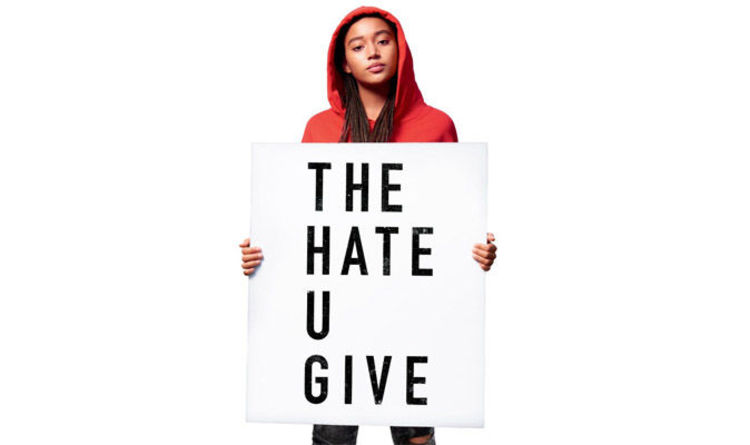The Hate U Give
Starring Amandla Stenberg, Russell Hornsby, Regina Hall, Common, Issa Rae, and Anthony Mackie
Directed by George Tillman Jr.
Reviewed by Michael Dalton
[rating: 5/5]
“If you don’t see my blackness you don’t see me!” This proclamation is uttered like a battle cry in the second half of George Tillman Jr.’s powerful film The Hate U Give by fhe film’s heroine Starr (Amandla Sternberg) when her white boyfriend begs her to accept him as the colour-blind young man he swears he is. By the time we get there, we’ve seen Starr’s father (Russell Hornsby) lecture her and her two brothers on what to do when the police pull you over or detain you (“Keep your hands where they can see them”), we’ve seen Starr witness a friend, Kalil, an unarmed black boy (Algee Smith), shot dead by a cop, watched her slowly process the implications of staying silent, watched her get warned by a drug dealer (a snarling Anthony Mackie) to do just that, and then witnessed a black community fight back and eventually riot after the cop walks free. Now, while they may sound like spoilers, they’re not. Tillman has an infinitely more detailed picture in mind. He wants us to see how an innocent girl goes from passive observer to warrior. How she goes from numbness to rallying with her community and declaring her space. He wants us to see not so much how black people get proactive, but precisely why.
The Hate U Give is adapted by the late Audrey Wells (she passed away the day before the film opened) from Angie Thomas’s novel, THUG LIFE, an acronym for The Hate U Give Little Infants Fucks Everybody. Provocative and profound, few movies on the subject have gotten us in as close as this one does. One of its contentions, for my money the film’s most powerful one, is how young white people, who declare themselves pro-black, have no idea, beyond their basic hatred of racism, just what the black experience is. For a good length of the story, none of Starr’s friends, at the essentially white private school she attends, are fully aware of the circumstances of the shooting death of Kalil. The fact that Starr was actually present at the scene gives the film its gravity. She switches off and seems determined to stay that way until one of her girlfriends expresses sympathy for the humiliation the cop’s family are now sustaining. Such is Stenberg’s astonishing performance as Starr (the film runs for over two hours and she’s barely off screen), we see her anger and full understanding of injustice slowly build to breaking point. In one incredibly powerful scene, she demonstrates for her friend just what its like to be black and have a cop detain you for no apparent reason. Where the movie jars you is that a number of cops we see here doing their jobs are black. In one scene, two officers misreading a situation have Starr’s father down on the ground. Out comes her phone and she starts to record yet another mistake by the law and they continue until one of them realises she is, as comes to be known throughout the film, “The Witness”.
There’s more, much more than I’ve discussed here. It fans out as Starr’s perspective continues to change. Starr’s Uncle Carlos (Common) is an officer too and when she quizzes him about what he’d do in a white neighbourhood were he to pull over a resident who didn’t keep his hands where he could see them he tells her, “We live in a complicated world”. Tillman Jr. demonstrates an incredible sense of texture. In recent years, more and more films are focussing on black lives and the inherent dangers they live with. Look at Loving, Fruitvale Station, Selma, and this year’s BlacKkKlansman. I have no doubt they’ll keep coming. Watch this one closely. There’s elegance, fire and brimstone in The Hate U Give and it’s all in the details. Told from the most important perspective, Tillman Jr. and Wells dissect the problem with nerves of steel.




